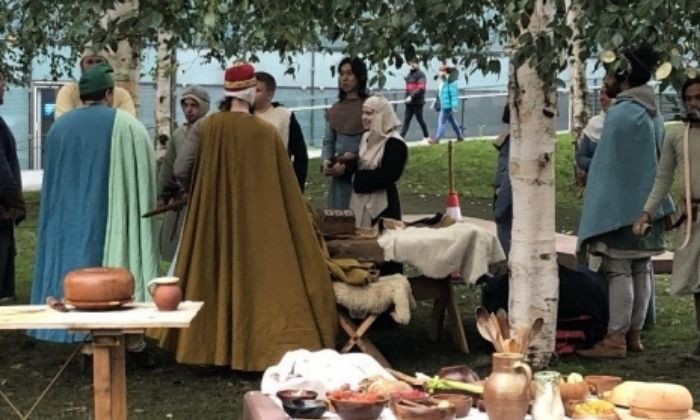Creating the Manchester Medieval Quarter Festival: A Q&A with Jerome de Groot
20 Feb 2025
Professor Jerome de Groot received a Humanities Strategic Civic Engagement Fund (HSCEF) award in 2023 for his mission to create a festival that celebrates Manchester’s Medieval history.

In 2023, Jerome de Groot, Professor of Literature and Culture, received an award from the HSCEF, the Faculty’s social responsibility fund which supports projects inspired by Greater Manchester and that aim to improve local communities. This enabled him and his colleagues in the Centre for Medieval and Early Modern Studies (CMEMS) to work in partnership with organisations and institutions across the city to establish the Manchester Medieval Quarter Festival.
The unique festival, held in Manchester’s historic Medieval Quarter, gave over 2,000 visitors the chance to experience an overlooked part of the city’s history through a variety of engaging activities, including history tours, live music, workshops and medieval entertainment.
We spoke to Jerome to find out more about what he hoped to achieve with this project, its impact on the local community, and why the HSCEF has been instrumental.
Can you tell us more about your project?
About three years ago, the CMEMS were approached by Manchester City Council and Chetham's Library to develop what they call the Medieval Quarter. Chetham’s already had their own small festival that they were interested in expanding, which demonstrated the demand for a historicised event. There are many festivals in Manchester, but not many that emphasise the specific history of the city before 1800, so it is often lost. It was a really nice opportunity to work with interesting partners on commemorating the city's heritage, but also to take our research into different spaces.
What did you hope to achieve with your project?
The big thing was to develop a sustainable festival that happened every two years, focused on the Medieval Quarter and on Medieval and Early Modern research. We’ve now done two festivals and received amazing feedback.
The Council wanted people to associate that area with a different type of history of Manchester, a different type of heritage. It’s a Victorian city, but there is a much longer history. We also have to challenge the idea of what ‘Medieval’ is. It’s often considered to be white and European and that's not what our research is interested in – just focusing on that experience is limited. We are a very diverse and interesting population in our city, and we should be as inclusive as possible.
How did your project support the University's social responsibility and civic engagement priorities?
We were interested in working with local communities and bringing those people into the conversation. The funding means we can offer these things for free, and that is not inconsiderable if you want to bring families and schools in. It also encourages interest in multiple other cultures and ways of thinking about the contemporary world.
How was your project enhanced and inspired by our location in Greater Manchester?
I think the University has an incredible civic responsibility and sometimes doesn't necessarily act upon that. I have spent a lot of time working with community groups around the city, and the University can seem monolithic and quite frightening to some people.
Our location is the most important thing, really, because Manchester is a great city that needs to reconfigure the way that it presents itself. Being part of community-based projects where we are supportive and helpful, where we undertake knowledge exchange, learn and listen, is crucial.
What has been the biggest impact that your project has had?
People enjoying themselves and changing the way that they think about the city. It takes time, but I think it will have made a difference and there is already a sense that that we are slowly expanding upon the idea that Manchester has a longer history.
We've undertaken genuine co-working and co-production and built up relationships and collaborative networks. We’re now seeing the impact we're having on local schools and groups that are very much open to this new way of thinking. It's a long process, but I think we've got to the point where it’s now bearing fruit and getting a cumulative momentum.
In relation to the project, what have you got planned for the future?
The festival is returning in autumn 2025. We’ve got cool new commissions, we've got a parade, we're going to work with my colleagues and take their work out into the field. We've got some really nice things that are being driven by work that's happening in the University and that, for me, is kind of the point.
How has the funding aided your project?
It’s been instrumental. The University is better resourced than other organisations in terms of funding, but also logistics. I've got a bit of space where I can do this, whereas the people I work with at other organisations have a million other things to do. The University can prove transformative, and we don’t see that as much if we stay in our own research silos. We don't always see the kind of effect that we can have. It’s also the ethics of working outside the University. This type of funding tells us to do things properly and be a good partner, so I really appreciate that.
What advice would you give to anyone wanting to launch their own project via this fund?
The fund is brilliant, go for it! I'm always overly aspirational and try and do too much, so don't to be too ambitious, but do it right. The main thing I think everyone needs to take away from these types of projects is that they take time, but the funding is transformative.
To find out more about Jerome’s project, visit the Manchester Medieval Quarter Festival website.
Find out more about the Humanities Strategic Civic Engagement Fund.
